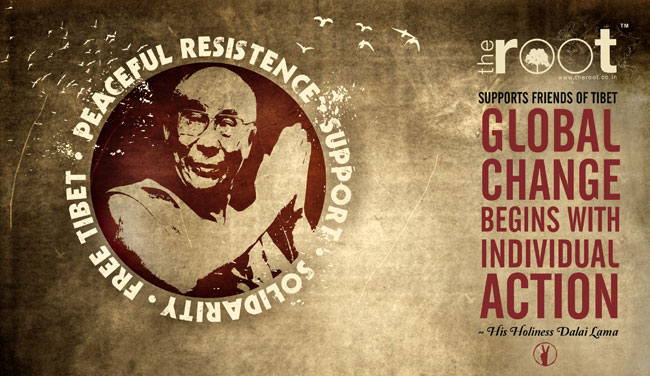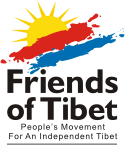. . . . . . . . . . . . . . . . . . . . . . . . . .
"World Tibet Day in New Delhi"
(New Delhi, Delhi, July 06, 2011)
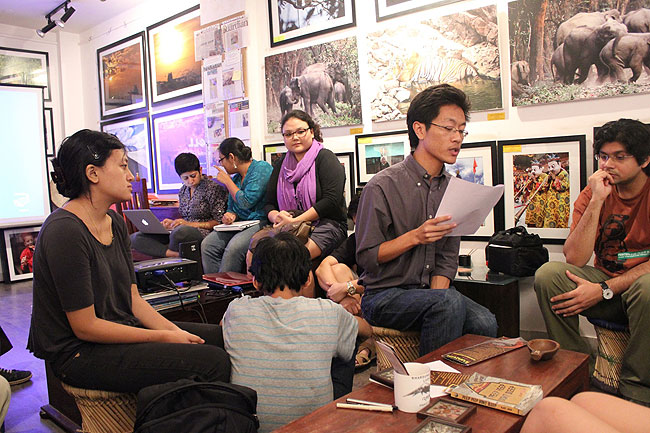
Exiled But Rooted: Jamyang Phuntsok, Tibetan poet in exile and a postgraduate in Physics recites his poem "When It Rains in Dharamshala" during World Tibet Day event in New Delhi on July 6, 2011.
A report on "A Poet, A Painter and Seeds: An Evening of Three New Faces of Tibet" programme organised in New Delhi by The Tibetan Art Collective and the Friends of Tibet on World Tibet Day — July 6, 2011.
Delhi: As the evening started, we saw the Kunzum Travel Cafe, in Hauz Khas, New Delhi, fill up hesitantly. The group around the middle waited for the projector to get fixed. "Why a projector?," someone asked. "Oh yes, for the screening of the film." No, not just for the film. Thupten Kelsang Dakpa, the founder member of the Tibetan Art Collective had improvised a powerpoint presentation for introducing the artist. No, he did not wear the traditional Tibetan shirt, and nor did his sister, Tenzin Paldon, wear the Chuba while introducing the collective. The reason was not that they did not like to wear those traditional markers of Tibetan culture, but because the evening was consciously dedicated to making space for different possibilities of being Tibetan to emerge. But, first, the poet.
This 6th of July is indeed auspicious. The day was not just the birthday of His Holiness the Dalai Lama, but was also the date for the first of the events for some members of the Tibetan Art Collective to showcase their talent. The poet, Jamyang Phuntsok, a postgraduate in Physics, started his oration with the poem, "When it rains in Dharamshala." Knowing that another prominent poet activist, Tenzin Tsundue had a poem of the same name, he explained his reasons, for writing a poem with the same title, to be, "I wanted to give voice to the Dharamshala that I know." The poem was indeed an exploration of the Dhramashala of stinky streets, glaring tourists and the juxtaposition of Tibetan motifs. In the lines of his poetry, you saw the creases of exile, in the way they percolated into Jamyang's home. His narrative caught the details of being born in exile, with an irony that he willfully inflicted upon himself, "I remember how my parents would watch the weather forecast in anticipation, for if the temperature went down in Punjab, which would mean better sales of sweaters."
The painter, Tenzin Gurmey, a student of Delhi College of Art was quietly but stolidly drawing another kind of exile. All his paintings are untitled, or titled by friends, and he never signs his paintings. "What's the point," he says," its not like they are even finished." He talked about his earliest lessons from his father, a traditional artist, who discouraged him to erase an error, but to work the error into the final form. Somehow, that lesson becomes intrinsically Tibetan once you see his notion of exile painted across a canvas, through the facade of a mother, of a disemboweled yak and even in the way he experienced Delhi. His conception of the three provinces of Tibet, coming together in a stringed harmony of a Dramnyen had the effect of moving Tibet a step away from the Shangri la that it is made out to be: It is not the land of Buddhist monks and prayer flags, but a land of contradictions whose faces are often blurred with the land itself.
Seeds — the film was made in 2009, by Tenzin Dazel and assisted by Tenzing Dakpa. We heard an audio file of Dazel, who is now based in Paris, in which she introduced the film. Again, what resonated from her voice was not just the mere fact that she was born in exile, caught in the mires of the host and the guest. Not being a film maker, she began looking around for Tibetans living in Delhi, in the colonies that the film is based, to act in it. The whole team consisted of amateurs and those who looked at the film to express their frustration and an underpinning guilt of their inability to do something for their motherland, as protests and riots inside Tibet continued all through 2008. The film is able to successfully capture this ennui that lives in exile are woven within. In the time of the Beijing Olympic Torch coming to Delhi, in 2008, the film follows a group of young Tibetans trying to figure whether to join in the protests at Jantar Mantar or not. The film is possibly a first in the way it portrays this listless wait, that exile seems to represent.
Sometimes, the fact that these 'products' are made, is not sufficient. The fact that one evening they were all woven together and given a form is when we get to see that the Tibetan in exile, has a lot to say.
. . . . . . . . . . . . . . . . . . . . . . . . . .
"World Tibet Day in Mumbai"
Guide to the Movement: Kabir Saxena of The Buddhist Foundation welcomes the gathering at the Colaba YMCA in Bombay during the World Tibet Day event organised by Friends of Tibet on July 6, 2011.
On July 6, 2011 at the YMCA, Mumbai, a group of quiet people gathered to light candles. Let in the evening, at about half past six, the group swelled into a crowd. The reason for the gathering was to celeberate the day His Holiness the Dalai Lama, Tenzin Gyatso, was born. They were joined by Tibet supporters and Buddhists all over the world. The event also formed a part of a chain of events crossing borders into varied countries, in the form of World Tibet Day. But the difference in this celebration was that the birthday celebrations were a way to not just remember Tibet, but also to commemorate the second uprising of the people in the Uyghur province of People's Republic of China, which began on the July 5.
The event was thus a double edged sword. Though the peace loving supporters would cringe at the use of the word sword, the fact is that each time people who are not even vaguely related to Tibet, gather around and declaim the colonial aspirations of the PRC on the Tibetan people, it leaves its marks on those violent aspirations. Only this way, do we understand the significance of even a single candle lit in Mumbai, in the name of Tibet.
The opening speech was by the National Coordinator of the Friends of Tibet, CA Kallianpur. His words highlighted this role that the supporters played. He ironically remarked how the day was both a happy and a sad occasion for him, to celebrate a leader of the Dalai Lama's caliber, in exile. Thus, when he lit the first candle for the event, it was as if he offered his prayers for the good health of the XIV Dalai Lama and also, his condolences for the land of Tibet.
Buddhist monk Kabir Saxena of the Tibet Buddhist Foundation spoke on how Buddhism in India got revived due to the coming of His Holiness and Tibetans after centuries of decline of the religion. The Buddhist monks also offered prayers for the long life of His Holiness the Dalai Lama. On the list of those who in support of Tibet cause were journalist Sridhar Naik who spoke about his first interaction with the Dalai Lama when he interviewed him twenty years back, and the sense of happiness which he experienced during the interview. Advocate Martin, who emphasised on the need for Tibetans to continue their struggle against the military occupation. He gave the example of Poland and how the Polish people formed the Government in Exile and kept the spirit of Polish Nationalism alive. Even in camps in India, we had the opportunity of visiting them during the Nazi occupation of Poland, Martin told the gathering. Advocate Martin urged the Tibetans to unite with other ethnic groups like Mongols and Turks to form a joint front and to come forward to take the responsibility of doing something positive in this direction in a simple and cost effective manner.
The lighting of candles was followed by the screening of "Sun Behind the Clouds", a documentary by Tenzing Sonam and Ritu Sarin. The internationally-acclaimed feature-length documentary showcased the 2008 uprisings and the impact of it left on the future prospects of an independent Tibet. The audience was engaged till the end of the film, and it consisted Buddhist monks. They came with sweets, which they happily distributed to the people who had gathered to celebrate their spiritual guru's birthday. For the Indians gathered around, this was probably one return gift they would remember, for its sweetness and its irony.
The opening speech was by the National Coordinator of the Friends of Tibet, CA Kallianpur. His words highlighted this role that the supporters played. He ironically remarked, how the day was both a happy and a sad occasion for him, to celebrate a leader of the Dalai Lama's caliber, in exile. Thus, when he lit the first candle for the event, it was as if he offered his prayers for the good health of the 14th Dalai Lama and also, his condolences for the land that he came from.
. . . . . . . . . . . . . . . . . . . . . . . . . .
"World Tibet Day in Kochi"
Children celebrate World Tibet Day and the 76th birthday of His Holiness the Dalai Lama on July 6, 2011 at Kochi, Kerala. 'Eggless' cakes were decorated with both Tibetan National Flag and Chinese flag on both sides were cut to symbolise the separation of Tibet which is under the Chinese military occupation since 1949. Once again Tibet is coming back to our headlines in India with more and more concerned people getting attracted to the issue which they consider one of the most important issues not only to India but to the entire subcontinent. During the World Tibet Day event in Kochi Friends of Tibet announced that it will soon launch a new organisational network called 'Friends of Tibet Young' which will function as a online platform for young Tibet supporters to come forward to share their stories of solidarity with Tibet with the rest of the world.
. . . . . . . . . . . . . . . . . . . . . . . . . .
"A Candle Light Vigil for Tibet"
The Root poster in solidarity with Friends of Tibet and World Tibet Day.
Mumbai: This week, Tibet support groups across the globe will be seen celebrating World Tibet Day as spiritual leader Dalai Lama celebrates his 76th birthday on July 6. On the other end of the spectrum, the day also marks the second year of the gruesome Uyghur uprising, which shook East Turkestan in 2009. In Mumbai, Friends of Tibet, a people's movement that focuses on political issues of Tibet will commemorate the victims of the uprising. They hope to create awareness by exposing China's bad record against human rights by observing a candle-light vigil and showcasing a documentary about their struggle.
Says Sethu Das, Founder-President of Friends of Tibet (India), "The purpose of celebrating World Tibet Day is to help restore essential freedom for those living in Chinaoccupied Tibet and to bring to light the genocidal threats faced by them. We also wish to celebrate the unique beauty and value of Tibetan culture and thought." Talking about the documentary 'The Sun Behind the Clouds: Tibet's Struggle for Freedom' that will be screened on Wednesday, Das says, "It is informative and educational to anyone who wants to know more about the ongoing Tibetan struggle. It was screened at the Mumbai International Film Festival in 2010 and was the winner of Silver Conch Award. This is a good opportunity for those Mumbaikars who have not seen it before."
. . . . . . . . . . . . . . . . . . . . . . . . . .
| Home |
Friends of Tibet is a people's movement to keep alive the issue of Tibet through direct action. Our activities are aimed at ending China's occupation of Tibet and the suffering of the Tibetan people. Friends of Tibet supports the continued struggle of the Tibetan people for independence. Friends of Tibet is also one of the principal organisers of World Tibet Day around the world.
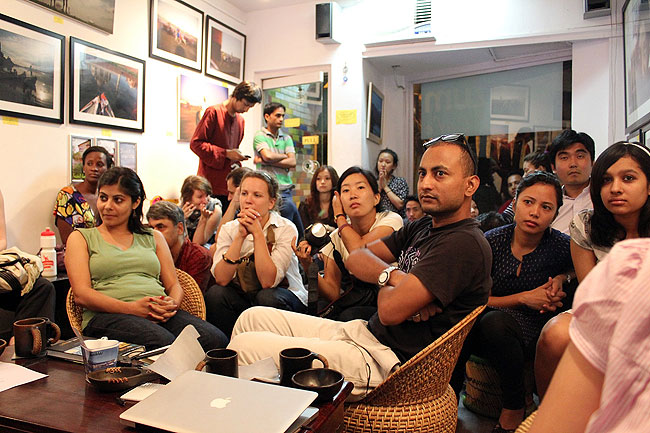
(By Our Correspondent, The Verdict Weekly, July 30, 2011)
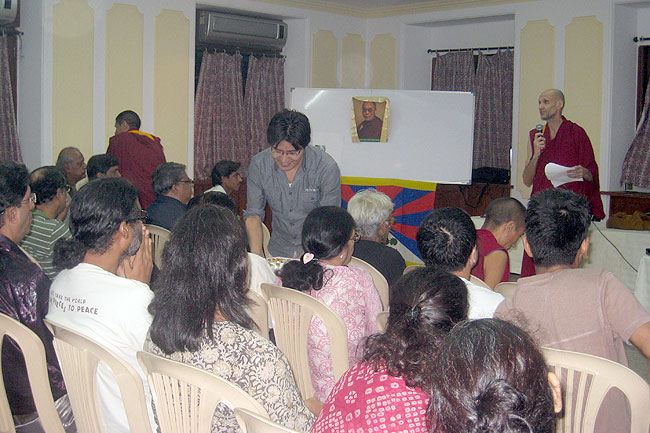
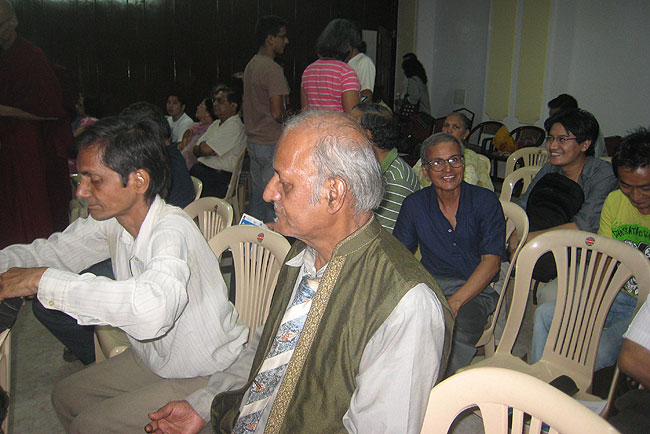
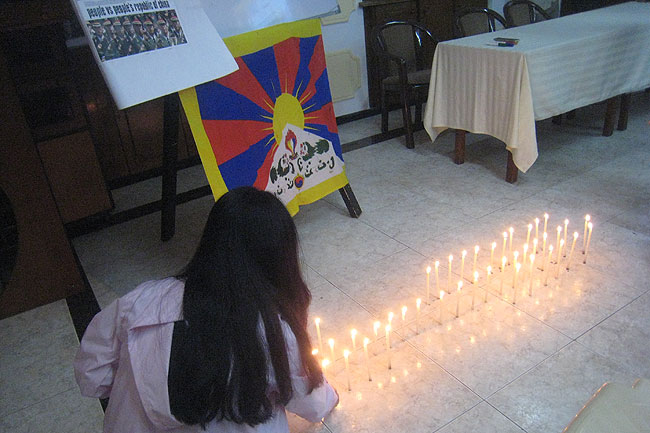
(Kochi, Kerala, July 06, 2011)
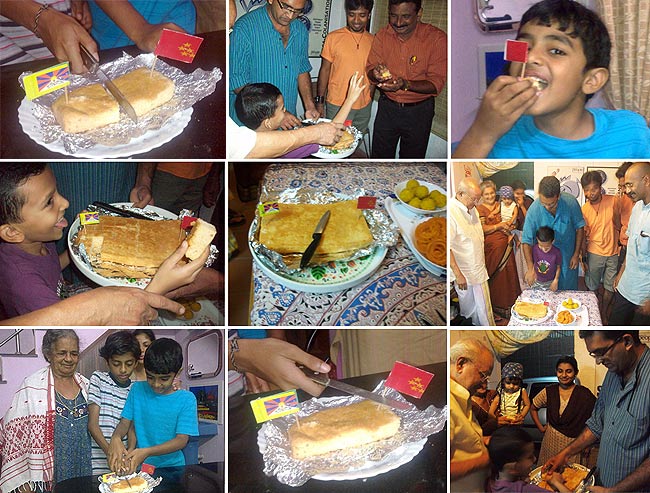

(By Pooja Maheshwary, The Hindustan Times, July 3, 2011)
